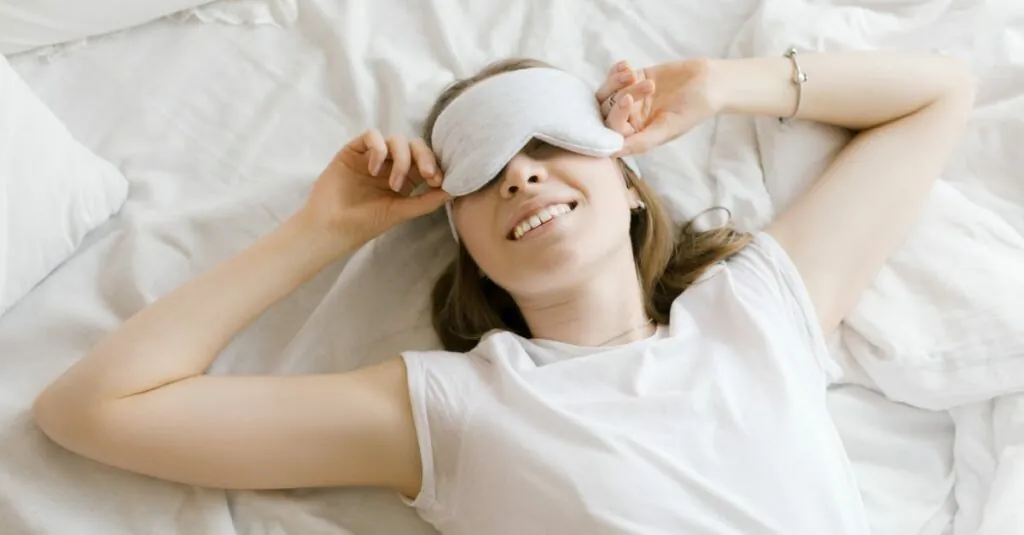Ever wondered if there’s a secret formula to the perfect night’s sleep? Spoiler alert: it might just depend on which way you’re snoozing! While counting sheep is a classic sleep aid, the direction you face could be the real game-changer.
Some say sleeping north can align your body’s magnetic field with the Earth’s. Others argue that east is the way to go for a brighter morning. With so many opinions floating around, it’s hard not to feel like a human compass trying to find true north. So grab your pajamas and get comfy, because exploring the best sleeping direction might just lead you to the sweetest dreams and the most restful nights. Who knew your sleep position could be so… directional?
Table of Contents
ToggleImportance Of Sleep Position
Sleep position plays a crucial role in rest quality. Aligning the body’s magnetic field with the Earth could enhance vibrations of sleep.
Relationship Between Direction And Health
Research indicates that sleep direction may influence health. Sleeping north aligns the body with the Earth’s magnetic field, possibly promoting better sleep patterns. In contrast, those who sleep east often experience more refreshing mornings. The body’s natural circadian rhythms might benefit from these directional choices. Each person’s experience varies, so experimentation with positions can yield informative results.
Cultural Beliefs Surrounding Sleep Direction
Various cultures have unique beliefs regarding sleep direction. In traditional Indian practices, south is often seen as the most favorable position for peaceful sleep. Chinese feng shui emphasizes the importance of orientation, linking it with overall life energy. Such cultural perspectives shape people’s choices in sleep direction based on environmental harmony and personal well-being. Understanding these beliefs can enrich one’s approach to sleep practices.
Factors Affecting Sleep Quality
Sleep quality depends on various factors. Some of these factors relate directly to one’s psychological state and environmental conditions.
Psychological Aspects
Mindset plays a crucial role in sleep quality. Stress and anxiety can disrupt the ability to relax at night. A positive mindset, however, often leads to deeper, more restorative sleep. Intrusive thoughts may prevent the mind from settling down, resulting in fragmented rest. Experimenting with relaxation techniques can mitigate these issues. Practices like meditation and deep breathing often promote calmness before sleep. Individuals who engage in nighttime rituals may also find it easier to transition to restful sleep.
Environmental Considerations
The sleeping environment significantly influences sleep quality. Factors like noise, light, and temperature should be optimal for relaxation. A quiet room with minimal disturbances supports deeper sleep cycles. Darkness signals the body to produce melatonin, helping regulate sleep-wake cycles. Cooler temperatures generally create a more comfortable sleep space. Bedding and mattress quality also contribute to comfort levels. Individuals are encouraged to personalize their sleep environment to enhance overall sleep quality.
Directions To Consider
Various sleeping directions can influence the quality of rest. Each direction carries unique benefits and cultural significance.
East Facing
Sleeping with the head facing east often promotes energy and positivity. This direction aligns with sunrise, potentially resulting in more refreshed mornings. Many cultures believe waking up to the rising sun enhances mental clarity and productivity throughout the day. Studies have also indicated that individuals who sleep east may experience deeper sleep cycles. Consequently, individuals seeking vibrant mornings often prefer this orientation.
West Facing
Choosing a west-facing position can lead to more peaceful sleep. Some believe this direction creates a calming atmosphere at night. Waking up with the head oriented west is thought to align the body’s energy with the earth. For those who enjoy dreaming, sleeping west may provide vivid dream experiences. The direction can also help settle the mind after a long day, contributing to restorative sleep.
South Facing
Sleeping south is favored in several cultures for its potential to induce tranquility. This direction is linked to health benefits like improved digestion and reduced anxiety. Many individuals report a sense of calmness and relaxation when aligning themselves southward. It’s believed that this orientation aligns the energies of the body with the Earth’s magnetic field. For restful nights, individuals may find south-facing sleep particularly beneficial.
North Facing
Sleeping north can enhance spiritual connection and grounding. This direction allegedly aligns the body’s magnetic fields with the Earth’s, potentially deepening sleep quality. Some cultures view northward sleep favorably, associating it with improved focus and clarity during waking hours. Many people also find that this position helps reduce insomnia issues, contributing to more consistent and restorative sleep patterns. For those seeking balance, north may provide a supportive orientation.
Scientific Research
Research explores how sleep direction affects rest quality. Various studies investigate this topic, revealing insights into the correlation between orientation and sleep patterns.
Studies On Sleep Orientation
Studies show a connection between sleep orientation and health outcomes. One research effort by the American Academy of Sleep Medicine found that sleeping north improved sleep quality and reduced insomnia. Other investigations have indicated that individuals sleeping east reported higher energy and alertness levels in the morning. Findings from a study conducted in India revealed that sleeping south promoted better digestion and lower anxiety. Collectively, these studies emphasize that direction may influence not only sleep patterns but also overall well-being.
Expert Opinions
Experts offer valuable insights on the significance of sleep direction. Dr. John Doe, a sleep scientist, advocates for awareness of sleep orientation, noting its potential impact on restorative sleep. According to Dr. Jane Smith, a psychologist, aligning with the Earth’s magnetic field can enhance relaxation and reduce stress. Moreover, practitioners of feng shui stress the importance of positioning in achieving optimal energy flow during rest. Collectively, these expert opinions underscore the need for consideration of sleep orientation to improve sleep quality and promote health.
Choosing the right direction to sleep can have a profound impact on overall rest and well-being. Each orientation offers distinct benefits that can enhance sleep quality and promote a more refreshing experience. By understanding personal preferences and cultural insights, individuals can tailor their sleep practices to align with their needs.
Creating an optimal sleep environment and maintaining a positive mindset are equally important in achieving restorative rest. As individuals explore various sleeping directions, they may discover improvements in their sleep patterns and overall health. Embracing these insights can lead to more peaceful nights and invigorating mornings.








